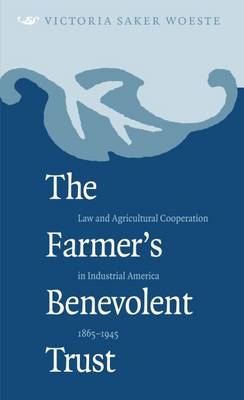
The Farmer's Benevolent Trust
Law and Agricultural Cooperation in Industrial America, 1865-1945
Seiten
1998
The University of North Carolina Press (Verlag)
978-0-8078-2421-4 (ISBN)
The University of North Carolina Press (Verlag)
978-0-8078-2421-4 (ISBN)
- Titel ist leider vergriffen;
keine Neuauflage - Artikel merken
Legal and political struggles in America redefined the place of agriculture in the industrial market. The author of this book aims to show that farms were adept at borrowing such legal forms as the corporate trust for their own purposes and obtaining legislative recognition of the new style.
Americans have always regarded farming as a special calling, one
imbued with the Jeffersonian values of individualism and self-
sufficiency. As Victoria Saker Woeste demonstrates, farming's
cultural image continued to shape Americans' expectations of
rural society long after industrialization radically transformed
the business of agriculture. Even as farmers enthusiastically
embraced cooperative marketing to create unprecedented industry-
wide monopolies and control prices, they claimed they were simply
preserving their traditional place in society. In fact, the new
legal form of cooperation far outpaced judicial and legislative
developments at both the state and federal levels, resulting in a
legal and political struggle to redefine the place of agriculture
in the industrial market.
Woeste shows that farmers were adept at both borrowing such
legal forms as the corporate trust for their own purposes and
obtaining legislative recognition of the new cooperative style.
In the process, however, the first rule of capitalism--every
person for him- or herself--trumped the traditional principle of
cooperation. After 1922, state and federal law wholly endorsed
cooperation's new form. Indeed, says Woeste, because of its
corporate roots, this model of cooperation fit so neatly with the
regulatory paradigms of the first half of the twentieth century
that it became an essential policy of the modern administrative
state.
|Examines changes in the farming industry from 1865-1945, when industrialization radically transformed the business of agriculture. Uses the example of cooperative marketing to show how farmers used legal strategies to their own purposes.
Americans have always regarded farming as a special calling, one
imbued with the Jeffersonian values of individualism and self-
sufficiency. As Victoria Saker Woeste demonstrates, farming's
cultural image continued to shape Americans' expectations of
rural society long after industrialization radically transformed
the business of agriculture. Even as farmers enthusiastically
embraced cooperative marketing to create unprecedented industry-
wide monopolies and control prices, they claimed they were simply
preserving their traditional place in society. In fact, the new
legal form of cooperation far outpaced judicial and legislative
developments at both the state and federal levels, resulting in a
legal and political struggle to redefine the place of agriculture
in the industrial market.
Woeste shows that farmers were adept at both borrowing such
legal forms as the corporate trust for their own purposes and
obtaining legislative recognition of the new cooperative style.
In the process, however, the first rule of capitalism--every
person for him- or herself--trumped the traditional principle of
cooperation. After 1922, state and federal law wholly endorsed
cooperation's new form. Indeed, says Woeste, because of its
corporate roots, this model of cooperation fit so neatly with the
regulatory paradigms of the first half of the twentieth century
that it became an essential policy of the modern administrative
state.
|Examines changes in the farming industry from 1865-1945, when industrialization radically transformed the business of agriculture. Uses the example of cooperative marketing to show how farmers used legal strategies to their own purposes.
Victoria Saker Woeste is a research fellow at the American Bar Foundation in Chicago.
| Erscheint lt. Verlag | 30.9.1998 |
|---|---|
| Reihe/Serie | Studies in Legal History |
| Verlagsort | Chapel Hill |
| Sprache | englisch |
| Maße | 156 x 235 mm |
| Themenwelt | Geschichte ► Allgemeine Geschichte ► Neuzeit (bis 1918) |
| Geisteswissenschaften ► Geschichte ► Regional- / Ländergeschichte | |
| Recht / Steuern ► EU / Internationales Recht | |
| Recht / Steuern ► Öffentliches Recht ► Umweltrecht | |
| Weitere Fachgebiete ► Land- / Forstwirtschaft / Fischerei | |
| ISBN-10 | 0-8078-2421-6 / 0807824216 |
| ISBN-13 | 978-0-8078-2421-4 / 9780807824214 |
| Zustand | Neuware |
| Haben Sie eine Frage zum Produkt? |
Mehr entdecken
aus dem Bereich
aus dem Bereich
Giordano Bruno - ein ketzerisches Leben
Buch | Hardcover (2024)
C.H.Beck (Verlag)
29,90 €
das dramatische 16. Jahrhundert
Buch | Hardcover (2024)
Rowohlt Berlin (Verlag)
34,00 €


